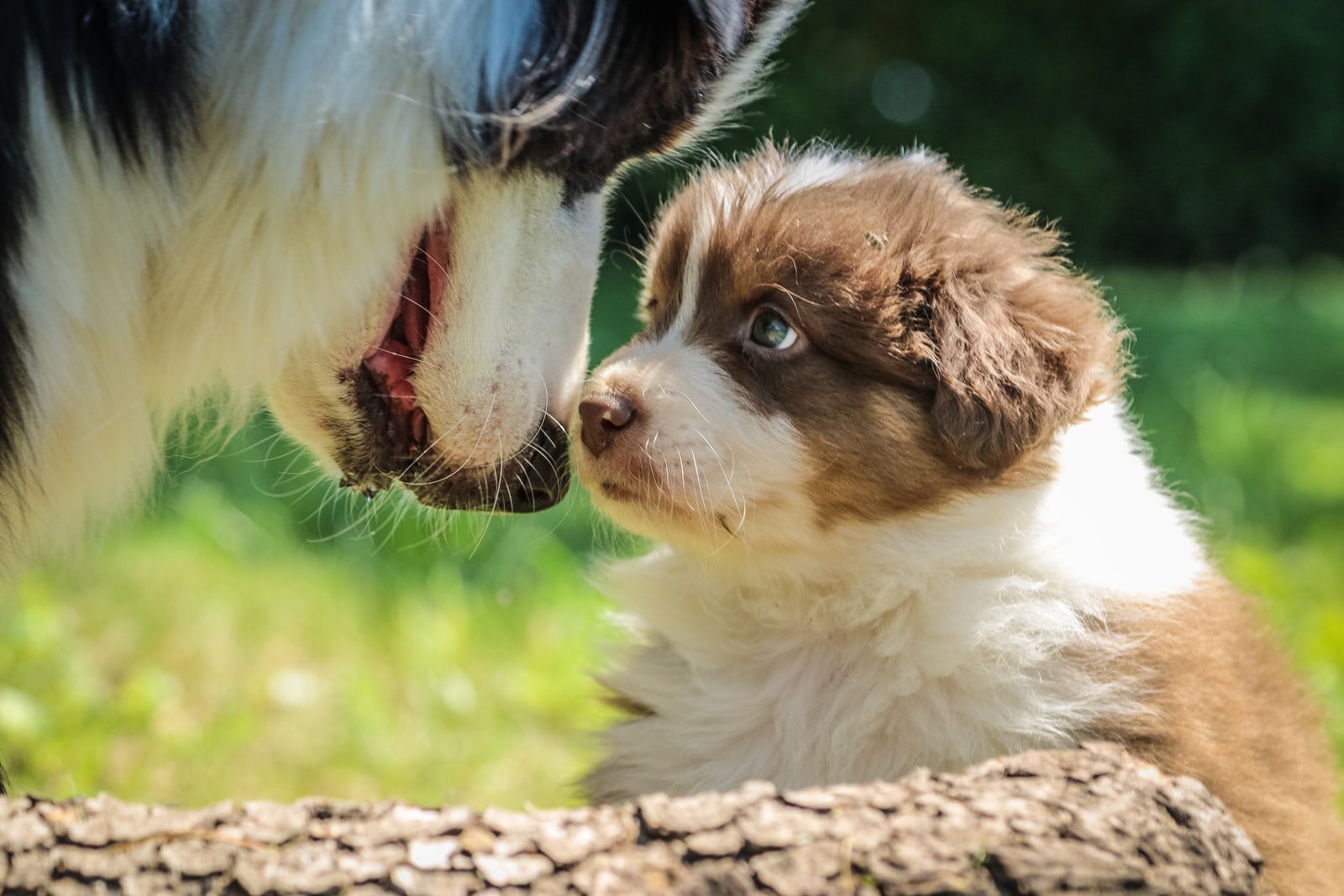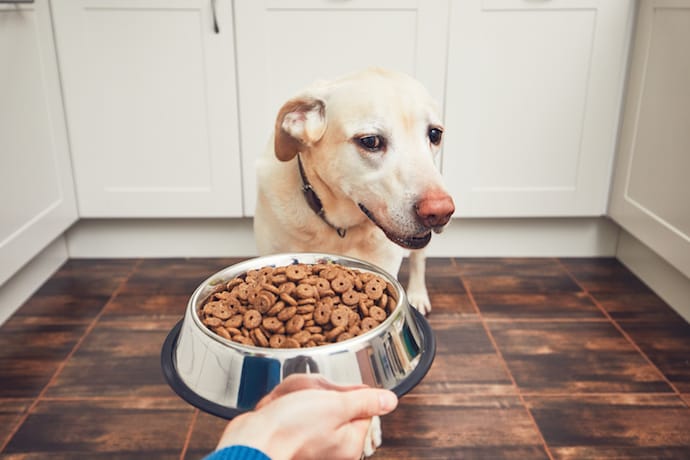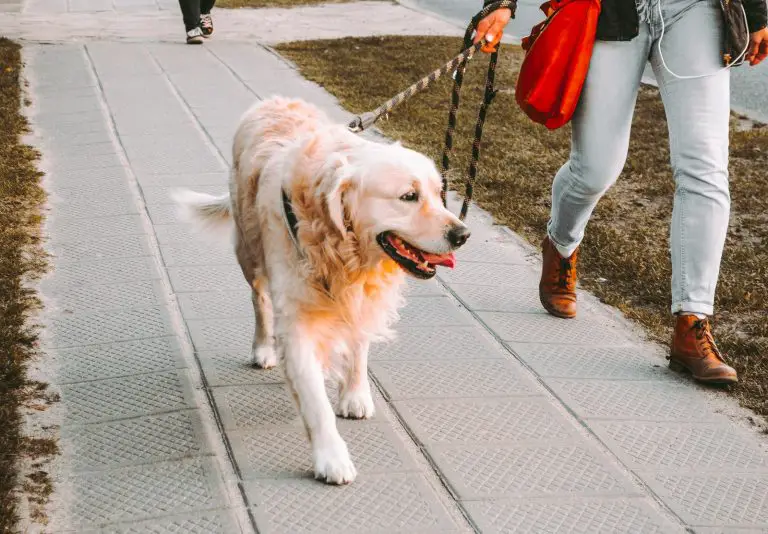Getting a newly born puppy is every pet owner’s dream, but do you know how long should a puppy stay with its mother?
The joy of bringing a puppy home is immense, and the last thing you’d want is to create unnecessary problems for your puppy. A lot of people don’t know the importance of the early stages of development for puppies.
In the first few weeks, puppies are in their early socialization period, learning to be dogs. Proper socialization gives puppies the right head start for being a socially healthy dog. Separating pups from their mother and the rest of the litter can lead to many problems.
Wondering how early is too early when it comes to removing a puppy from its mother? Then, read this blog post.

When Can You Separate Puppies From Their Mom?
Puppies should stay with their mothers until they are 8 to 10 weeks old. Keeping the puppies with their mothers during this time ensures that they remain healthy both physically and emotionally.
In addition to their mothers, the puppies should also stay with their litter mates. Playtime with the siblings gives them a chance to learn socialization. You should, therefore, wait for a minimum of eight weeks before separating a pup from its mother.
Taking puppies away from their mother too early will cause developmental deficiencies, and a lack of social skills. You should also keep in mind that leaving a puppy with its mother for too long might also lead to other issues such as dependency and a lack of independent survival skills. This transitioning process can be a bit confusing for new pet parents, mainly because you want to do right by your furry friend.
So, to guide you through this overwhelming process, we have put together this comprehensive guide to help you understand when you can separate puppies from mom.
Keeping an eye on your pup and monitoring their development can help you understand when to take a puppy away from its mother. You will notice various signs that show how a puppy becomes self-sufficient as it grows.
Puppies can see a little, but cannot hear or smell in the first three weeks of their life. They are dependent on mothers for food and physical support during this time. Mothers help their pups by nursing and keeping them safe until their senses develop entirely.
The mother provides all the nutrition to puppies for the first few weeks during the early developmental stage. You will only need to intervene if the puppy is weaker than others in the litter (the runt of the litter), the litter is too large, or the mother has a feeding problem. Otherwise, you can rest assured that the mother will provide all the nutrition that the puppies need to stay healthy.
You can start giving soft, watery dog food to the puppies after the third week. The pups will still be nursing, but the weaning process usually begins around this time. You can soak the puppy’s kibble in warm water and then feed it to the pup. Another option is to feed a canine-specific milk replacement formula. You can also use these options in case the mother has a feeding problem or has died.
After the third week, puppies start relying less on their mothers. They engage more in play with their litter mates. During the four to seven-week period, they tend to explore on their own without much help. They learn from their siblings when a bite is too hard and also start understanding pack hierarchy.
By the seventh and eighth weeks, the puppy’s brain will have fully developed. This development makes it safe for them to leave their mothers at this point. The interaction of the puppy with its mother and siblings will give you an idea about its maturity. When the puppy makes less contact with its mother and plays more with the siblings, you can remove the pup from its mother.
However, allowing puppies to stay with their mother and litter mates for 10 weeks prevents the occurrence of behavioral problems later on in their lives. The period from the seventh to the tenth week of a puppy’s life is one in which it truly learns how to socialize with other dogs and humans. This is why puppies that are left with their mothers till the tenth or eleventh week of their lives are even easier going and balanced when compared to those who are taken away from the mother at an earlier stage.
The training for bite inhibition is a long process that starts very early. The puppy gets the first lesson in this training by playing with its siblings and mother. The learning continues regularly until the puppy is 8 weeks old. By this time, their teeth have developed, and they have also learned when a bite is too hard.
The training, however, continues even after you take the puppy home. However, for the most part, the mother and siblings will already have given the puppy most of the bite inhibition training it needs. This doesn’t in any way mean that you can’t further train your puppy and reinforce its bite inhibition from time to time. This is especially vital to do if you have kids at home.
If your puppy bites you with their teeth, you need to show your pain to them with a simple exclamation, such as saying the word “ouch.” Next, you need to remove the area that they bit from their mouth gently. Repeat this process to reinforce the puppy’s bite inhibition. Don’t ever punish your puppy for biting you as this will make it lose its trust in you, and it might provoke it to bite you unexpectedly.
Staying with the mother and litter also helps puppies develop touch tolerance. Usually, puppies who have been separated from their litter too early don’t like being touched. Before taking a puppy home, make sure you know how comfortable it is with touching and playing. This will make them develop touch tolerance and will make it easier for them to grow comfortable with your family.
However, if a puppy stays with its mother or its fellow litter members for longer than 3 months, then it will likely not make for a good companion for humans. This is because it will only be tuned to the touch of fellow dogs and not the touch of humans. Such puppies develop a bit of an aversion to human touch and prefer to socialize with other canines only.
A mother dog starts weaning her puppies at about three weeks of age. By the eighth week, weaning ends. If a puppy still drinks the mother’s milk at the age of seven weeks, wait another week before separating the two. During this time, you can continue to train it to eat puppy food. If a mother has already weaned the puppy by the seventh week, you can separate them.
Monitoring the behavior of the mother gives you an idea when the pups are ready for weaning. The mother weans them by leaving them more on their own and encouraging independence. Starting from the third week, she will gradually wean them over time. The process of weaning helps in the transition of the puppy until it is time to take it away.
The mother might even feed the pups from her mouth. During this period, ensure that the mother gets proper nutrition for sufficient milk production. You can consult with your vet about its diet throughout the nursing the weaning period.
What Is the Role of a Pet Owner While Separating Puppies From Mother?
There are a couple of things you can do that can help the weaning transition for puppies. The more time puppies can spend without their mother, the more successful is the transition. After feeding puppies with solid food, give them enough time to play independently.
As you see the puppy becoming more independent and self-confident, you can gradually increase their “me time.” Over time, puppies will be able to go for several hours without their mother.
You should also remember that every litter is different. So don’t grow weary if things don’t work according to your expectations. Give the puppies enough time and consult your vet if you face any problems during this process.

What Are The Effects of Separating a Puppy Too Early From the Mother?
Separating a puppy from its mother during the transition can lead to many behavioral problems in puppies. These problems make it difficult for them to adapt to different situations later in life. Taking the puppy away before 8 weeks can make it fearful of other dogs. It is better to keep the whole litter together during these 8 weeks.
An analogy of a 3-year-old child makes it easy to understand the gravity of this situation. Separating a puppy from a mother too early is like sending off a 3-year-old child to a boarding school. No one can expect a 3-year-old to deal with the emotional stress of such a situation.
Such a young child can walk and can also talk to express his needs. The child also feeds himself when you give food and tells you when he needs to go to the toilet. Despite being able to do so much, the young child still needs the protection of his mother.
Similarly, a puppy who is not 8 weeks old is too young to be socially and emotionally independent. Even a 5 or 6 weeks old puppy is not ready to leave the emotional support of its mother. Following are some of the problems that a puppy faces due to early separation from the mother:
Removing puppies from their mother even at 6 weeks or less causes them to lose their appetite. This then ultimately leads to weight loss and distress. It also makes the puppies more prone to diseases. The loss of appetite and distress makes the puppy grow weaker.
The mother helps the puppies in weaning and introducing them to solid food during the 3 to 8 week period of their life. This training allows puppies to fend for themselves and eat on their own when separated from their mother. A puppy that is not weaned correctly will have difficulty adjusting to solid food without the support of its mother.
If you separate a puppy from its mother too early, they start exhibiting symptoms of separation anxiety. They become too clingy to the pet parents and tend to develop a fear of getting abandoned. Instead of becoming independent, they start relying more on their owners. They become overly-independent on their pet parents, so much so, that it gets difficult for the owners to leave them on their own.
Separation anxiety also causes other problems like not eating and sleeping correctly. Puppies that are weaker than others in the litter might even need more time to mature. They learn slowly, so keeping them with their families for 10-14 weeks is better. This will ensure that once separated from the mother; they will be able to thrive independently.
Separating pups from their mother before 8 weeks also affects their ability to calm down. They become anxious and find it difficult to be happy. You will also notice that they whine, cry, and bark a lot. It also seems that no amount of your attention comforts them. As they grow, they might seem to adapt to their new setting, but the agitation remains. Often, these puppies grow into dogs that continue to cry through the night.
Such dogs will also hate it if you leave them alone on their own. They will bark and whine until you come back. These signs show that they are unable to self-soothe. Sometimes, the frustration increases so much that they cause physical destruction in the house. They use this as a way to vent out stress and anxiety. This problem can be especially serious as they can harm themselves out of agitation and anxiety.
Early separation from the mother makes it difficult for the puppies to socialize. They lack the confidence to grow comfortable with new situations and people. They are also unable to interact with other dogs due to the fear of danger and uncertainty. Even when you give them a chance to learn social skills through training, they hesitate.
They aren’t as quick to adapt to new situations as puppies that were separated at the right age are. They become aggressive and are very likely to exhibit fear-biting behavior. You might be able to control these problems with the help of training. But it is almost impossible to solve these issues completely.
Why Do Some Breeders Separate and Sell Puppies Early?
Sometimes due to an emergency, breeders have to sell puppies before they are 8-weeks old. There can be different reasons like the death of the mother or the illness of other pups in the litter. If there is no such emergency, the breeder is doing so out of ignorance, irresponsibility, or greed.
People often think that taking a puppy home during the first few weeks helps it to adapt to its new home easily. Unfortunately, it can create more problems for them than they can think of.
Sometimes owners insist on taking the puppy at only 5 or 6 weeks of age. So, the breeders have to give them away anyway. If a breeder tries to talk you into taking a puppy before it is of age, you should refuse to take it.
Sometimes breeders are trying to avoid the costs related to the care of puppies. They want to give away the puppies early, so they don’t have to put in the effort of training the puppies. Before buying a pup, make sure the breeder adheres to the right practices.
Lack of knowledge and ignorance are the main reasons for separating a puppy early from its mother. Breeders often don’t give a second thought about what is best for the puppy or how it can affect you. If the owners know the importance of this matter, they can avoid many problems later.
Final Thoughts on How Long Should a Puppy Stay With Its Mother
You can find varying opinions about the right age at which you should separate a puppy from their mother. Pet owners want to take their new puppy home as soon as possible, but it is important not to separate them too early.
Puppies learn a great deal during their first few weeks from their mother and litter mates. They learn social skills and develop emotional stability during this time. The traits that they develop during the first eight weeks remain with them throughout their lives. You can give them all the affection and care, but there are some things they can only learn from their family!







